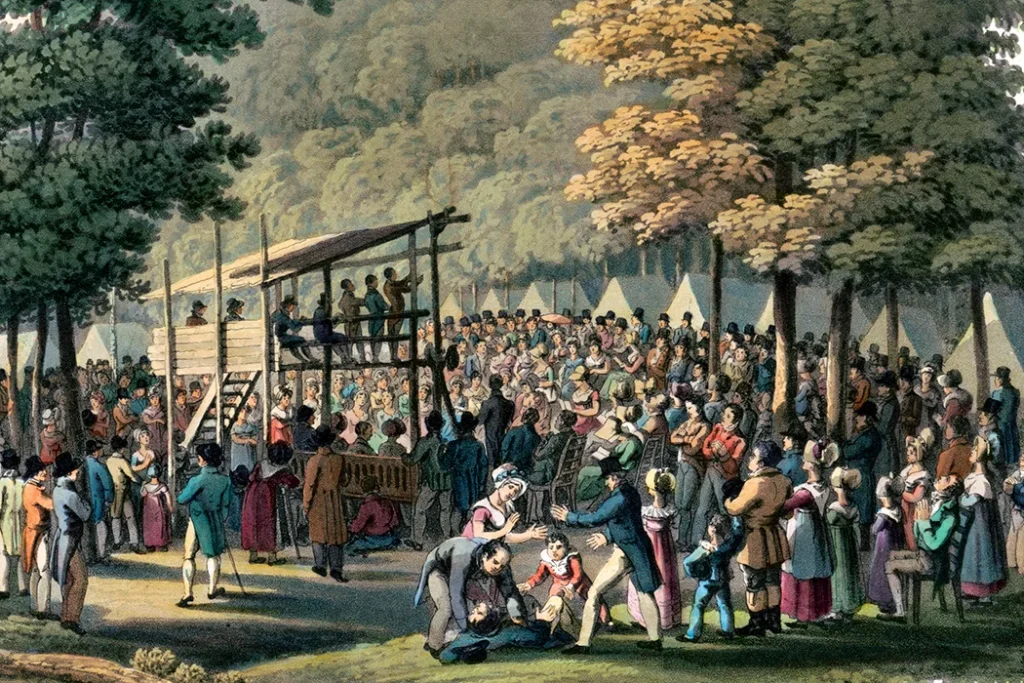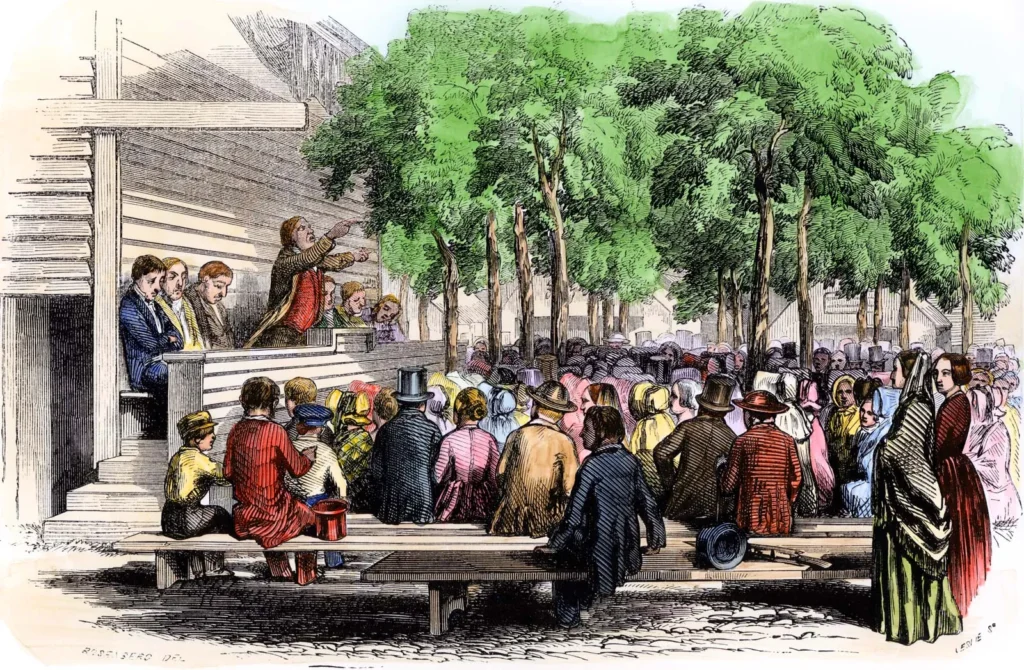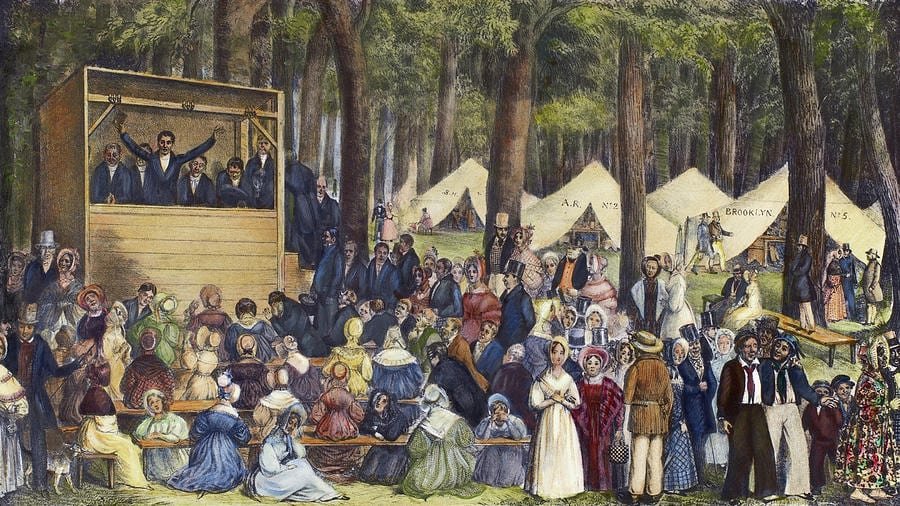There is no political cure for an ailing culture. Remedy either arises from within or the patient succumbs to the false panaceas of social justice, sustainability, environmentalism—the day’s menu of toxic enthusiasms. Yet at the same time, we are called to live our religious convictions in the face of political constraints and counterfeit pieties of the age—and place—in which we find ourselves. What to do?
An affiliation of ministers in New York State’s Hudson Valley are doing what American evangelicals have done successfully twice before in the late eighteenth and nineteenth centuries. They are calling Christians to a revival.

Notice of it arrived via Standupnsing, the feisty, biblically literate blog created by singer/songwriter Chip Murray. Every week his Sunday morning e-mail alert carries this header: “The true soldier fights not because he hates what is in front of him, but because he loves what is behind him.”–G K Chesterton
Is the country on the cusp of another Great Awakening? I am not ready to believe so but, God knows, we are certainly in great need of one. Two weeks ago, American Thinker ran a column: “Time for Another Great Awakening.” Given the state of American history in today’s schools, it is likely that a large—very large—proportion of the American electorate has never heard of the two critical revival movements that shaped the national character. Jeff Lukens’ column included a spare, capsule reminder:
The First Great Awakening in the mid-1700s created the moral climate for the Declaration of Independence and the founding of a new country, conceived in liberty, that would truly become a light to the nations.
The Second Great Awakening in the mid-1800s was even more potent and culminated with Abraham Lincoln and the abolition of slavery. As a result of this movement, the United States has liberated more people economically, politically, and spiritually than any other nation in history.
The problems of America today cannot be solved by politicians or our broken culture. We need another Great Awakening on a scale and resolve equal to the first two. There are some hopeful signs this may be happening.
Next Sunday’s event in Poughkeepsie includes [Fr.] Frank Pavone who will speak on pro-life issues. Also on the roster will be Rev. Bill Benuchi, founder of the New York Faith and Freedom Coalition. The Coalition’s statement of purpose reads: We believe that the greatness of America lies not in the federal government but in the character of our people—the simple virtues of faith, hard work, marriage, family, personal responsibility, and helping the least among us. If we lose sight of these values, America will cease to be great.
Among the “least among us” were residents of New York who found themselves in the crosshairs of quarantine mandates during COVID hysteria. Tricia S. Lindsay, a criminal and civil litigation attorney, took issue with the bureaucratic tyranny that disregarded Constitutional protections for freedom of religion. She is also scheduled to address the audience.
I do not know the name of other speakers. But these three alone give you a good idea of the tenor of the revival.

What has been handed down to us has continued to resonate, in different times, different ways, and under pressure of dissimilar events. Today’s whispers of revival bring to mind a brief essay in V. A. Demant’s Theology of Society (1947), a small collection of essays on Christian polity. Long out of print, the burden of it is that the Christian message of deliverance is not a function of politics. His essay, “The State in a Renewed Christendom,” is blunt:
The primacy of the spiritual must be upheld, not as a retreat from the secular tasks of life, but as a condition of handling them aright. . . . When social living is cut away from direction imposed by awareness of supernatural reality and from the chastening sense of sin, it does not remain merely secular, but becomes perverted.
That is the substance of his essay “The State in a Renewed Christendom.” An Anglican priest, theologian and social commentator, Demant was canon of St. Paul’s Cathedral, London, at the time. Two years after the end of World War II, Londoners had finished burying their dead but marks of the Blitz were everywhere. In the shadow of that hellscape, Canon Demant had no illusions about the world’s self-improvement.
Neither does Anglican priest and historian Edward Norman: “Without another world to stand upon there is no way of saving this one.”
• • • • •
The American Church is taking a cue from its evangelical brothers. In his latest e-broadcast, Cardinal Dolan reminds Catholics that a Eucharistic Revival is in progress. As part of this revival, the Church in the State of New York will gather on October 20 – 22, 2023 at Our Lady of the Martyrs Shrine, located in Auriesville, New York, for a Eucharistic Congress:
I encourage all in the Archdiocese of New York to attend the Congress, especially on Saturday, October 21st, which will feature a special Mass at 11 a.m. celebrated by Bishop Terry LaValley, followed by a Eucharistic Procession in the afternoon. In addition, there will be engaging speakers, lively music, opportunities for confession and eucharistic adoration, time to socialize, food available (although feel free to bring your own picnic), and so much more!
Given the quality of the “so much more” on show in the recent World Youth Day jamboree, I fear to think evangelicals might have more of a knack for revivals.
Note: Norman, once Roger Scruton’s colleague at Cambridge, is a prolific ecclesiastic historian. His Secularisation (2002), takes Britain as a case study in institutional decline, but the analysis cuts across denominational lines. I recommend it.
Next Note: If you cannot find a solid copy of Demant’s Theology of Society, it can be read online at archive.org.




